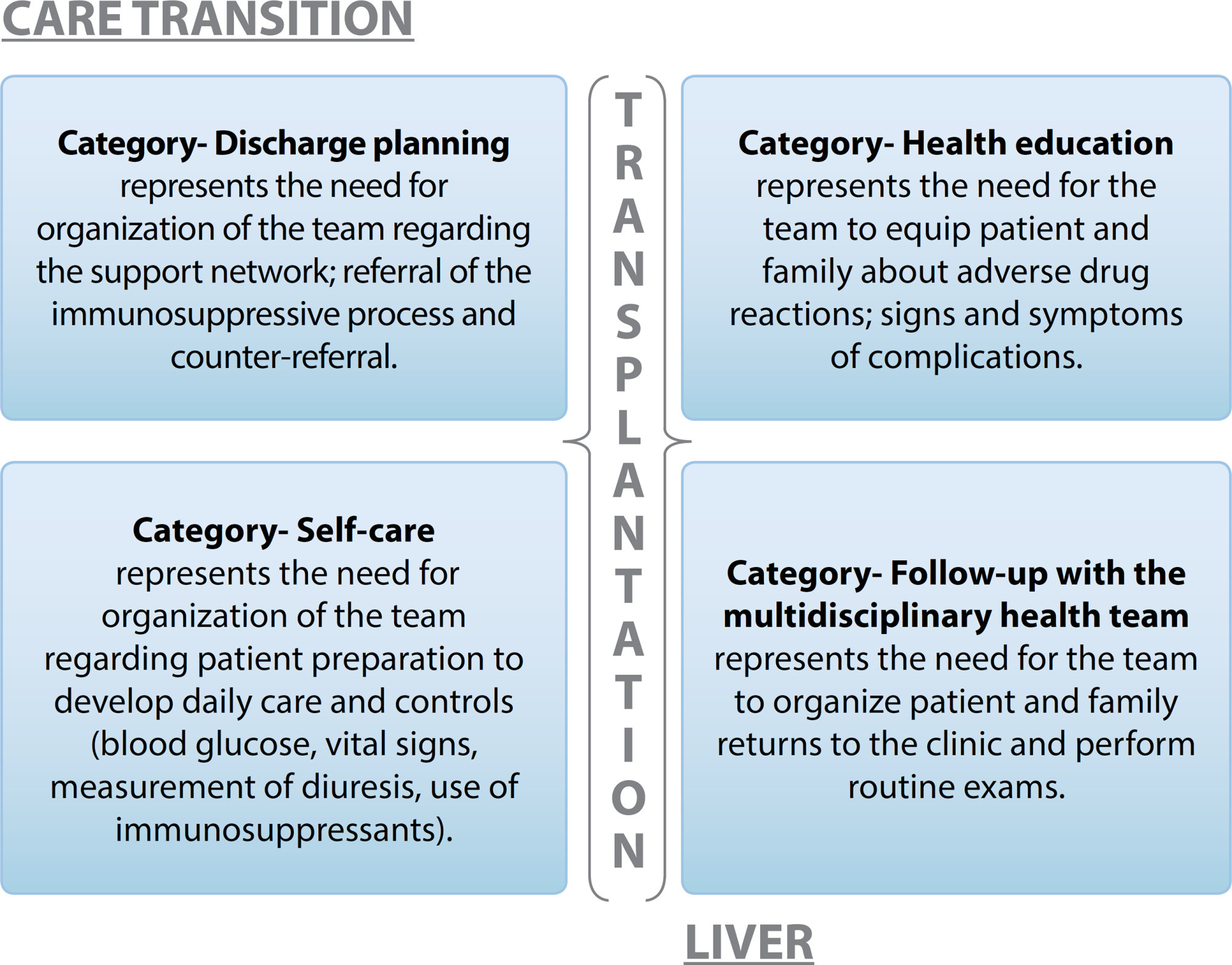-
ORIGINAL ARTICLE
Good Practices in Transitional Care: continuity of care for patients undergoing liver transplantation
Revista Brasileira de Enfermagem. 2021;74(2):e20200746
05-21-2021
Resumo
ORIGINAL ARTICLEGood Practices in Transitional Care: continuity of care for patients undergoing liver transplantation
Revista Brasileira de Enfermagem. 2021;74(2):e20200746
05-21-2021DOI 10.1590/0034-7167-2020-0746
Visualizações0Ver maisABSTRACT
Objectives:
to develop a guide of care recommendations for good practices in care transition for adult patients undergoing liver transplantation.
Methods:
a methodological study, based on the Appraisal of Guidelines for Research & Evaluation in the updated version, II. Care recommendations were sustained by conducting an integrative literature review and qualitative research.
Results:
from evidence, three topics emerged: Care Transition Planning; Health Education for Self-Care; Care Management. Each of the central topics has respective subtopics, totaling six, giving rise to 30 care recommendations. Concerning evaluators’ scores, in all domains the scores were higher than 90%.
Final Considerations:
the proposed guide assists professionals in conducting care transition in liver transplantation, ensuring greater safety for patients in continuity of home care.

-
ORIGINAL ARTICLE
Feelings, experiences and expectations of kidney transplant individuals and challenges for the nurse
Revista Brasileira de Enfermagem. 2021;74(1):e20200392
03-24-2021
Resumo
ORIGINAL ARTICLEFeelings, experiences and expectations of kidney transplant individuals and challenges for the nurse
Revista Brasileira de Enfermagem. 2021;74(1):e20200392
03-24-2021DOI 10.1590/0034-7167-2020-0392
Visualizações0ABSTRACT
Objectives:
to identify feelings, experiences, and expectations of kidney transplant patients, generated from the diagnosis of chronic renal disease until the post-transplant period, highlighting the challenges for nurses to incorporate individualized care to cope throughout the disease process.
Methods:
qualitative, descriptive research, carried with seven kidney transplant patients, in the city of Manaus, State of Amazonas. The data analysis followed the methodological referential of Bardin’s content analysis.
Results:
the diagnosis of the disease was experienced negatively, and hemodialysis was described as an imprisonment and health decline. The transplant meant an improvement in quality of life. The main difficulties were lack of a specialized hospital and low immunity.
Conclusions:
the nurses’ approach of chronic renal patient and with the renal transplantation favored the discovery of solutions facing the demands of the disease and allowed greater capacity to implement individualized care, surrounding a relationship of trust and respect.
Palavras-chave: Female and Male NursesKidney TransplantLife-Changing EventsNephrology NursingTransplantVer mais -
ORIGINAL ARTICLE
Trend of transplants and organ and tissue donations in Brazil: a time series analysis
Revista Brasileira de Enfermagem. 2021;74(1):e20200058
03-03-2021
Resumo
ORIGINAL ARTICLETrend of transplants and organ and tissue donations in Brazil: a time series analysis
Revista Brasileira de Enfermagem. 2021;74(1):e20200058
03-03-2021DOI 10.1590/0034-7167-2020-0058
Visualizações0Ver maisABSTRACT
Objectives:
to indentify the time trend of rates of organs and tissues effective donors, of reports and types of transplanted organs per million people of the Brazilian population.
Methods:
ecological study, of time series, about reports of organ donations and on transplants. The data were provided by the Registro Brasileiro de Transplantes and analyzed using polynomial regression.
Results
an increasing trend was found for potential donors and effective donors, with an average increase of 2.33 and 0.92 per year, respectively. The South Region had the highest rate of potential donors (83.8) and effective donors (34.1) and the North Region, the lowest rate (20.2 and 3.9). The family refusal was the main obstacle to accomplish the donation.
Conclusions
the results show an increasing trend of potential donors and effective donors throughout Brazil, with emphasis on the southern region of the country. Among the main reasons for non-donation, it is worth emphasizing family refusal and medical contraindication prescription.



